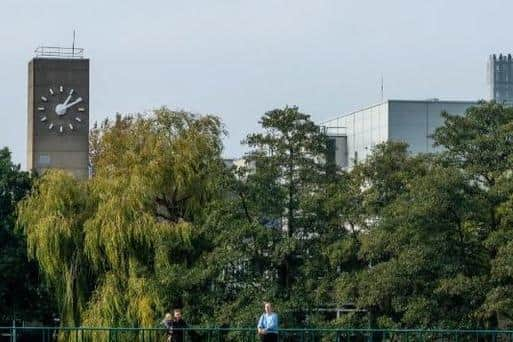Yorkshire's universities have golden role in tackling climate change, leader says
Many of the region’s institutions have set targets for the contribution towards reducing carbon emissions with the Universities of Leeds and Huddersfield committing to net-zero by 2030.
With research from the region including current projects aimed at tackling transport pollution in Africa, and reducing the risk of climate related poverty in Indonesia and Peru, the scale of the problem is one that is challenging Yorkshire’s academics.
Advertisement
Hide AdAdvertisement
Hide AdA region-wide audit of climate research is now underway to identify where expertise gaps fall.


Peter O’Brien is the executive director of Yorkshire Universities, a body which represents 12 of the region’s institutions, and also sits on the Yorkshire and the Humber’s climate commission.
He said: “We are a significant role in our own right, and we need to affect and implement change within higher education, both within the sector but equally beyond the sector.
“There’s a diverse array and capabilities that our universities have from a research perspective.
Advertisement
Hide AdAdvertisement
Hide Ad“Universities are an important vehicle for skills development and developing the talent of our future workforce.”
Mr O’Brien said that climate-based projects run by universities can attract talent to work in the region.
Earlier this year, the North Yorkshire Rural Commission published its final report in July which identified that the availability of green jobs is key to ensuring young people see the countryside as an attractive place to live.
For Mr O’Brien, that goes beyond rural areas to the region’s cities too.
Advertisement
Hide AdAdvertisement
Hide AdHe said: “The Aura Innovation Centre in Hull is very much working with companies and that’s been one of the driving forces to attract big companies to work on the Humber.”
He speculated that remote learning which is still taking place across many of the region’s universities also has its part to play in tackling climate change.
He said: “During the pandemic there was a move to remote learning and teaching. What are the lessons from that that could be applied as we move into normality? What does it mean around travel for universities, and housing stock?
“There’s a whole array of things that both at a leadership level is recognised as important - and there’s demands coming from staff and particularly from students.
Advertisement
Hide AdAdvertisement
Hide Ad“It’s noticeable that students are a strong voice in this area and want universities to do much more.”
And more students are choosing to study courses related to climate change, according to Mr O’Brien.
But one activist from the University of Leeds has said more needs to be done across the sector to encourage students to use their voices effectively.
Gaia Rattazzi, 19, is studying for a BSC in Environmental Management and Sustainability and is also an activist against climate change.
Advertisement
Hide AdAdvertisement
Hide AdEarlier this month, she addressed the Youth Against Carbon Conference, hosted by Zurich UK and attended by former Green Party leader Caroline Lucas.
She said: “Activism has been a bit harder at university because of everything being online. But there are some societies at Leeds that are really campaigning for change through politics.
“I think universities are more focussed on the career side of things. In terms of actual activism and supporting activists, they could do better.
“For climate societies run by students, we don’t get much funding and help from universities and it would be good to have more support on that side.”
Advertisement
Hide AdAdvertisement
Hide AdSchools are also being encouraged to reduce their climate emissions by local authorities.
The executive member for environment and climate change at York Council, Coun Paula Widdowson, said: “Schools in York are encouraged to explore renewable energy solutions to reduce emissions.
“York Council is supporting the partnership between Solar for Schools and York Community Energy.
“Solar for Schools is one of the leading experts in rooftop solar for educational buildings, with a huge amount of specialist knowledge.
“Their own contracted installers and a great educational programme for pupils alongside it which uses real data from the school solar panels as a teaching resource.”
Comment Guidelines
National World encourages reader discussion on our stories. User feedback, insights and back-and-forth exchanges add a rich layer of context to reporting. Please review our Community Guidelines before commenting.
